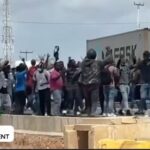What is #EndSARS? – How hundreds of thousands of Nigeria’s youth brought gov’t to a standstill over rogue police unit
Published on October 13, 2020 at 10:48 AM by Face of Malawi
On Sunday, the Nigerian government folded under the pressure of more than three million tweets and hundreds of thousands of young Nigerians who matched in the country’s most influential states to force an end to a notorious police unit accused of state-sanctioned violence against citizens.
The #EndSARS campaign on Twitter rose to number one on the global trend list on Saturday, an unfortunate development for the Nigerian government which had wished to shut down protests that started on Thursday. The attention of the world’s media was provoked and searchlight fell on Abuja and Lagos.
On Sunday, Protests took place in London, a city with a large immigrant Nigerian population as well as in a few other cities outside of the West African country.
SARS is the Special Anti-Robbery Squad that has become a mainstay in Nigeria’s domestic security apparatus for the last three decades. Tasked with tackling urban crime, SARS has only gained the reputation of being an unforgivingly brutal arm of the police who have killed, harassed and tortured many Nigerians, according to the non-profit Amnesty International.
Rapper Cardi B tweeted over the weekend asking for an explanation of what #EndSARS meant. Actor John Boyega, soccer star Raheem Sterling, singer Trey Songz and dozens of Black celebrities in the United States tweeted in support of the campaign.
The show of solidarity came from everywhere including from the youth of Nigeria’s favorite frenemy Ghana and from even South Americans. Explained simply as a Nigeria’s own fight against police brutality, the #EndSARS campaign was easy for ordinary citizens of the world to identify with.
The fight is ongoing even though the Nigerian federal police service says it ordered the “immediate disbandment” of SARS on Sunday? Why has this been met with skepticism?
History of SARS: Failed reforms and disbandment
It comes as a surprise to even many Nigerians but Sunday’s order was the fourth time the federal government had tried to disband or reform SARS, according to Stephanie Busari, the CNN correspondent in Nigeria. But a critical look at the past attempts shows that the orders are given immediately after SARS controversially makes Nigerian headlines.
However, the public is never privy to these processes of change the moment SARS no longer occupies the front pages of newspapers. One of such attempts at reforms was in 2018 when Vice-President Yemi Osibanjo, then acting as the president, ordered a complete “overhaul” of the police unit.
This attempt ended with the centralization of SARS’ activities to allow the office of the Inspector-General of Police (IGP) to have direct control over the infamous unit. But by the beginning of 2019, the IGP, Mohammed Adamu, was attempting to decentralize the administration of SARS for the same reasons for which SARS was centralized the year before – accountability for rogue officers.
Amnesty International says it believes the federal government lacks the political will to let SARS go, and that claim may be true. But the albatross around the neck of the federal government stems from the perception of how to deal with criminals in Nigeria’s urban centers.
Mob justice in urban Nigeria is still frequent due to the deadly force thieves are known to use. Another point is that the legal determination of who a criminal is has been challenged by Nigerian cyber fraud through which a good amount of young men have surreptitiously prospered overnight in the last decade.
When SARS was formed in 1992 in the state of Lagos, the police unit concentrated only in that locale, and to a good degree, SARS tamed violent criminals and won public affection that way.
According to the first head of SARS, retired Commissioner of Police Simeon Midenda, the group became the public’s favorite unit of the police service because “[A]s soon as robbery was reported anywhere in Lagos, we went out with speed, each team to a predetermined location. At our various locations, we patiently waited while the conventional policemen continued to chase the robbers around Lagos.”
The modus operandi of the early days were apparently successful. Beginning from 2002, SARS was replicated across all the states of Nigeria and that is where the trouble began.
A wanton disregard for human rights and property has been associated with SARS. The unit is known for arresting, harassing, torturing and killing mostly young people on sheer suspicion that these victims could not have legitimately afforded their cars, phones, laptops, jewelry or clothes.
As hundreds, if not thousands, of testimonies on social media, say, the officers of SARS approach crime in an uncompromising manner: they either have their way or you feel the pain. To be suspected of a crime is as well confirmation of your guilt.
SARS may have begun their assault on the urban poor in Nigeria but in the last few years, middle-class Nigerians have increasingly been targeted. But in the age of the democratization of the internet, targeting the middle-class has effectively taken the SARS problem to heights Nigeria’s government would rue.
Videos have shown that since the protests began last week, Nigeria’s police have not hesitated to meet protesters with force, something that has led to arrests and more than one confirmed death as well as hundreds of injuries. Water cannons, teargas and live ammunition have been used to disperse protesters.
But the youths in major states Abuja and Lagos have already shown a willingness to go all the way in spite of the danger to their lives. At the weekend, some of those protesting in Lagos passed the night outside the official residence of the state governor.
They are unwilling to fold particularly due to the police service’s commitment to redeploying SARS officers in other police units.
There are, of course, political implications for President Muhammadu Buhari through all of this. A fairly unpopular president in the south, Buhari has been accused of failing to listen to a popular social movement because he has no more presidential elections to run after 2023.
The president can also rest assured that the work of SARS is still preferred by a lot of older conservative Nigerians. Apart from this, already on the ground, his All Progressives Congress (APC) as well as youth groups in northern Nigeria where he hails from, have sought to attack the #EndSARS campaign as partisan and anti-north.
Source: Face2Africa


